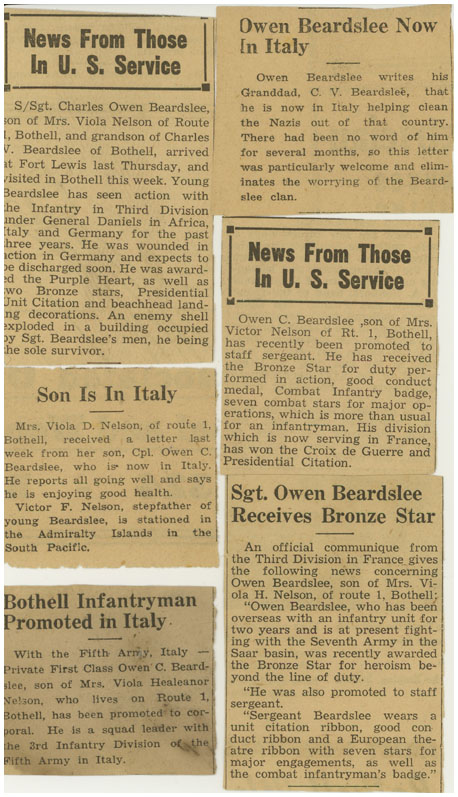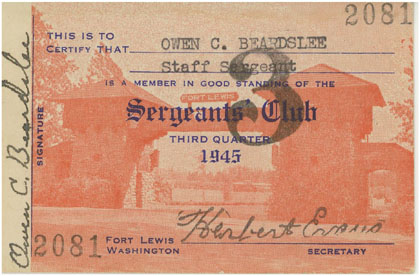
Staff Sergeant
Charles O.
Beardslee
Prelude
Signing Up
Africa
Sicily
Italy
Anzio
Southern France
Vosges
Colmar Pocket
Wounded
Going Home
![]()

Return to U.S.

Home in Washington state.
Going Home
During my stay in the hospital in Nancy all my hearing returned and I was feeling better. One day the doctor was on his morning rounds and when he came to me he said I was ready to return to duty. I immediately informed him that I didn't want to go back. I didn't say I wouldn't go back. I just had had enough.
I tried to make him understand that I was very tired of fighting and that I had over 500 days of combat to my credit already and I was exhausted. I told him that I landed in Africa and had been in nine major battles.
The doctor left and sent in a psychiatrist who said to me as he came to my bed, "So, 500 days in the line?" I replied, "Yes sir that's correct."
He took a little instrument shaped like a hammer with a hard rubber head and as I sat on the edge of the bed he tapped my leg just below my kneecap and my leg shot up in the air. He then took the handle of the hammer and drew it across my stomach just under my ribs in a half-moon motion. As he saw the muscles in my stomach involuntarily contract and relax over and over again he stood up and said, "You are on your way home soldier". The examination took no more than two minutes and I thanked God.
I was a complete bag of nerves and didn't realize it. I was started to feel like I was abandoning my friends and I knew I would miss the guys I had landed in Africa with but I knew the war would be over soon and everyone would going home and their separate ways. I was given the opportunity to save myself from that last bullet and so it would be.
As it turned out I missed the last five weeks of the war in Europe. I got my uniform and clothes back and was asked if there was anything else I needed. I asked, "Do you have any clean shirts?" and the supply sergeant said, " “Nope we don't have any clean shirts." So I put on my dirty shirt and got ready to leave.

Newspaper clippings on the homefront.
Cardiff, Wales
About 30 of us rode an ambulance to the airport. Some were on litters and some were walking. We filled that old C-47 and as soon as it was loaded which only took about 15 minutes, we were on our way.
We flew at 10,000 feet and this airplane had no passenger compartment heat. It got so cold the frost formed on the upright posts that held the litters in place. This was the first leg of my journey home and we were headed for England. After a half hour into the flight a B-17 pulled up alongside and escorted us till we could see the English Channel then it pulled away.
It was comforting to see that big silver bird flying along side with all those machine guns sticking out. The total time from Nancy, France to Cadiff, Wales took about three hours. I looked out the window as the plane was coming in for a landing and at about 500 feet. The plane flew over a golf course and there were about ten people playing. It just didn't seem right that only 100 miles away soldiers and civilians were fearing for their lives and here they were playing golf.
I was in the hospital in Cardiff for two weeks where my nerves healed. I did a lot of reading. I thought about the men I left behind. There were a lot of pretty nurses but the best thing of was there was no more smell of blood and gunpowder.
Southampton, England
After two weeks I shipped off to another hospital closer to Southhampton, England where there was a port of embarkation. Before I left the hospital in Wales I was asked if I needed any clothes and I said, "Yes do you have any shirts I could certainly use a clean one."
The answer was, "No we have everything but clean or new shirts". I put my dirty shirt back on. A train took me to Southhampton.
I arrived at the next hospital where they took all my clothes including my dirty shirt. I was to be at this hospital for a week and about the only thing I remember was that when I arrived it was a nice warm day and the daffodils and tulips were in full bloom and about four days later we had three inches of snow.
After about ten days they told everyone to be ready to move out and asked if we needed any clothes so I told them I needed a clean shirt and again I was told that they had everything but shirts. I thought the whole thing a little ridiculous. I had been through three hospital supply stations and none had any clean shirts.
V.E. Day
The next day we were ready to board a train and for a 30-mile trip to the port of embarkation. This was not to be however as late that afternoon the news was that the war was over. Everyone took three days to celebrate.
I didn't feel like celebrating but I wondered what the men in the First Battalion were doing. Were they celebrating like these rear echelon people were doing?
If I were there I think my celebration would have been to find a real bed someplace, crawl in and sleep for three days. Then after that maybe find some booze and get a little drunk and try to forget the past three years but then, as you see, I never forgot. I certainly didn't feel like burning up a lot of ammo like these people were doing.
Three days later I was at the port of embarkation and I boarded the Princess Elizabeth. As a former luxury liner with a swimming pool and ballroom and wide stairways between decks it was very different from the troopships that I had been on. This ship was transporting battle casualties and many officers from the Eighth Air Force. The officers were detailed to carry food to the bedridden casualties.
As the ship pulled away from the pier all I could think of was that the next stop would be in the good old U.S.A. The ship no longer had to zigzag to avoid submarines. We were at full cruise and it only took five days to cross the Atlantic Ocean.
The Princess Elizabeth pulled into New York Harbor about May 15, 1945. From the moment I sighted landfall at around 5:00 in the evening, I never went to my bunk or ate dinner.

Newspaper clippings on the homefront.

Fort Lewis Sergeants' Club Membership Card 1945.

War is left behind.

Charles Owen Beardslee, post-war portrait.
Charles O.
Beardslee | Prelude | Signing Up | Africa | Sicily | Italy | Anzio |
Southern France | Vosges | Colmar | Wounded | Going Home
Memoir appears by permission |